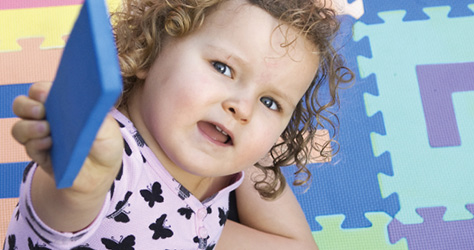Toddler development anxiety
It’s amazing watching your toddler develop new skills, but it’s easy to get anxious too. Here’s some tips on when to speak to your health visitor – and when not to worry.
At a glance
- What's normal
- What to keep an eye on
- What to do if you're worried

Growing up fast
We all want to see our wobbly little toddlers grow and flourish to become the confident, happy people we know they can be. But that does sometimes mean we get sucked into the world of competitive parenting where everyone else’s toddler seems to be walking and talking, and we worry we’ll be pushing them to their first job interview in the buggy. The truth is, there are some things to take action about and some things to patiently wait for your toddler to catch up on.
Take walking, for instance. Many are walking at 12-13 months, others not until 16-18 months and occasionally not until two or even later. If you’re worried – particularly if there are other aspects of their development you’re not happy with – then do ask your health visitor for advice.
It’s possible that something may be wrong, but if everything else seems to be developing normally – speech, social skills and fine motor skills – they will probably tell you that your little one is just taking their time and will walk when they’re good and ready.
What to keep an eye on
Talking is a slightly different matter. Research shows that kids who fall behind too far with talking when they’re 18 months to three years old find it difficult at school – and some may find it hard to catch up.
So it’s definitely worth keeping an eye on their speech. That said, it’s still true that each toddler is different – and some do pick up language a bit later. You’re looking for 10-20 words by 18 months and 50 words by their second birthday, say speech therapists. If they’re a long way behind this, it’s definitely worth asking the health visitor so any problems are caught early; they will also give advice on how to encourage language.
When it comes to general development, look for difficulties that your child is experiencing compared to the majority of their friends, such as:
- Problems with understanding
- Difficulties with hearing or sight (get any signs of a squint checked out immediately)
- An inability to make eye contact and problems interacting with other toddlers and adults.
If your child is just a couple of months behind others in some skills but you feel everything is probably fine, hold your nerve: avoid any mums making you feel bad and celebrate the things your toddler can already do rather than fret about the things they can’t yet do.
It’s a case of trusting your instincts and not being afraid to consult your health visitor or GP if you feel something is wrong. They will be able to refer you to a psychologist, physiotherapist or speech and language therapist where appropriate.
You can also see more about your toddler's development with our milestones chart.